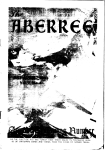SOME FORERUNNERS of TOTOLOGY
SOME FORERUNNERS
S enc
By HARDIN D. WALSH
HIS MONTH I'd like to talk about our
two most special abilities -- knowing
and unknowing. Naturally, we always
pride ourselves on what•we know,
tho probably the thing that makes the
game of life most interesting is that
which we do not know -- the surprises in
our daily life. We go to movies, and watch
television, and have stories presented to
us in which we pretend we do not know the
ending -- and this we enjoy very much.
There was a philosopher, Herbert Spencer, who was rather recent insofar as
this series goes -- 1820 to 1903. He was a
Totologist, along with many other philosophers. He gave us a wonderful definition
of Totology:
"God is Infinite Intelligence, infinitely diversified thru infinite time,
thru infinite space, manifesting thru an
infinitude of ever-evolving individualities." He was really looking at the whole
picture of Totality, God, Brahmin, or
whatever you wish to call it.
Spencer was an interesting individual.
At the age of 16 or 17, they finally
caught up with him and sent him to school
for three years. He had avoided it with
the assistance of an indulgent family. He
never studied philosophy, or science, or
biology -- the things in his writings for
which he became famous after he'd ended
his three-year enforced schooling. He
often spoke of this.
Here was a man who wrote 10 volumes of
probably the most profound writing, or
rather, the most exacting classifications
of all human activity that ever have been
written. He was an evolutionist, and
started- out originally to prove that
everything evolves. I think it was his
second book, on the evolution of life, in
which he says: "Life is the continuous
adjustment of internal relations to external relations. T h e completeness of
life depends upon the completeness of
this correspondence." And he went on to
elaborate on every facet of existence:
Biology, science, philosophy. He read
Hegel and Kant, getting half-way thru
Kant's books before giving up. Nor did he
read Hegel all the way thru, but he was
able to KNOW. He was a man who observed
and communicated, and it is this communication I want to discuss -- the knowingness
that enables an individual such as Spencer to look and to be aware and to know
what was occurring in the human race in
general.
In everyday life we have what we consider these internal relationships in relation to the external, and we consider
What have the philosophers of the pas`
contributed to the advanced thinking of today? In this series of articles, taken froi
the taped lectures of Hardin and Joanna
Walsh in Los Angeles, they point out how the
"Concept of Totality", as they teach it today, is not entirely near-except in application. -- The EDITOR.
this in relation to the body and to the
outside environment. But if there is such
a thing as Totality, it exists everywhere.
As Totality, we have internal activities
within us and there are certain relationships between these parts, manifesting,
as Spencer said, "in an infinitude of
ever-evolving individualities."
The concept that you are Totality is
the one thing that philosophers and teachers down thru the ages seem to have left
out or not stressed or developed means of
becoming aware of. Many have spoken of
it. But Spencer, in the early part of his
life, in about six volumes, said you could
never know this. He said, "What actuality
is, we cannot know." Here was an authority who wrote tremendous volumes -- I think
about 2,000 pages -- who says we cannot
know this. Kant said practically the same
thing many years earlier.
In his later life, Spencer said in his
writings, "We are forced to admit that we
cannot evaluate everything on a physiochemical level," and in his later days,
he wrote that he felt his entire work had
been a failure because of this contradiction. So, when he left his body, he wasn't too happy with what he had done, but
his work stands as a monument which has
been copied ever since, and the basis of
biology and many sciences.
As Totality, let us say you have focused your knowingness on a relatively
small part, and you have a vast area of
unknowingness. You might say this is an
avoidance mechanism, or a void of knowingness. At least, we try in many ways
not to know. Partly due to the magnitude
of the problem, the focusing of attention
is the actual problem. In our everyday
life, we are constantly focusing our attention -- the body is a focusing-attention
device -- and we are accustomed to focusing
our attention on the body and parts of
the body.
But how far can you focus your attention, your knowingness? Can you send it
out past the end of your nose? Take your
finger -- can you be aware of this finger?
Can you find the finger, be aware of it,
and know that it's there? Can you be aware
that the whole body is there? Can you be
of "TOTOLOGY


